#economical crisis
Explore tagged Tumblr posts
Text
A Reminder of the Fact, that Billionaires are not Real
I know. I know. Most people right now expect me to do more historical write ups. But please listen to me for a moment. This is kinda important. Because with Trump trying to make himself a fucking god emperor or some shit, I need y'all to understand this one thing.
This is a reminder: Billionaires are not actually real. As in: There is not a person who has a ten-figures amount of money on their bank account or anything like that. Nobody. Not Elon Musk. Not Jeff Bezos. Not Zuckerberg. Nobody. They are valued in the billions, but they are not actually billionaires. In fact some of them might not have so much as a million on their bank account from all we know.
So, why are they billionaires?
Because they own assets. Everyone who is really, really rich does not own money, but assets. Those assets are:
Real Estate and land
Luxury vehicles, yachts, private jets etc.
Art
Investment portfolios
Shares in companies
Stuff like mines and natural ressources
Patents and Copyrights
General stuff Marx would call: "The means of production"
The "net worth" that gets thrown around is just what people estimate the stuff those people own is valued at. But again: Very for of them have more then a few million actually on their bank accounts. And this also is the reason why right now we have so many billionaires.
Because since the entire bullshit in 2008 (for those who just turned 18: The real estate bubble burst and what not - watch "The Big Short" for more context) something has been happening called "the asset inflation". Basically the worth of all those assets has shot up in price BY A LOT, which made people who had been "just" multimillionaires before into billionaires suddenly.
But what you need to understand is, that this is just... It is fictional. It is a mirage. And if we all could just agree on that, they literally would have nothing. Because you cannot eat a yacht. You cannot eat company shares. You cannot do shit with any of that. You cannot even buy something with that.
You know how billionaires buy stuff? They go to a bank and go: "Hey, look at all this shit I have. I want to buy XY, so if you give me the money to do that, I will tots pay you back. And if I don't, you tots can take some of my shit, fair?" And the bank will go: "Yeah, whatever. Here. Have 20 billion fantasy dollars."
But all of this just works, because everybody agrees that if the billionaire or the bank sold whatever assets the billionaire offers up to someone else, they would actually get the money.
I wrote about this before: This is why we cannot get away from fossil fuels. Because right now everyone who has the money to invest in energy has not actually real money, but just valued assets - and those assets are oil pumps, and coal mines, and gas plants. And if we all agreed that we no longer want oil, gas and coal, those would be worthless - and those investors would no longer have money. Because their "money" is just the worth that those mines, pumps, and plants have.
And that is also, why they are so much against the "capital gains tax". It is more than it appears to be on the surface. See, a capital gain is, when those assets you hold gain in value. Which currently happens at an alarming rate. Some of them gain literally 20 or more percent in value each year. So if you implement proper capital gains taxes, those "billionaires" would have go give some part of the theoretical monetary gain they made each year from the inflation of those assets - and obviously newly gained assets - as money to the government.
Just look at our most hated billionaire: Elon Musk. In 2023 he had a net worth of 180 billion, in 2024 he ended the year on 410 billion. That is a gain of 230 billion. Almost all of it falls under "capital gains taxes". Now, let's say we implemented a really, really soft capital gains tax of just 5%. Which is nothing in terms of tax. You and I pay more taxes on our salary. But 5% of 230 billion is 11.5 billion. And because you cannot pay taxes in assets, Elon would need 11.5 billion to actually pay his taxes. And he does not have that. Nobody does. Again, I doubt that there is really anyone who has more than a billion in liquid assets (= actual money or anything that can be used as flat payment). In fact I doubt that most billionaires have actually a billion in liquid assets. Some might have several hundred million, sure, but nothing more. Again, this is basically monopoly money.
And if they would implement a capital gains tax this entire fantasy construct would come down. Because, yeah. Nobody actually has the liquid assets to pay the taxes. And they would have to admit that.
Right now their influence is build mainly on the fact that most people do not understand how "rich people economics" work. Which is why you need to understand it.
They do not have money. They have just assets. And those only are worth billions, because people let them get away with claiming this.
You know. We can just... adjust for that.
#economics#rich people#billionaires#anti capitalism#anarchism#housing bubble#capital gains tax#tax the rich#tax the billionaires#eat the rich#2008 financial crisis
434 notes
·
View notes
Text
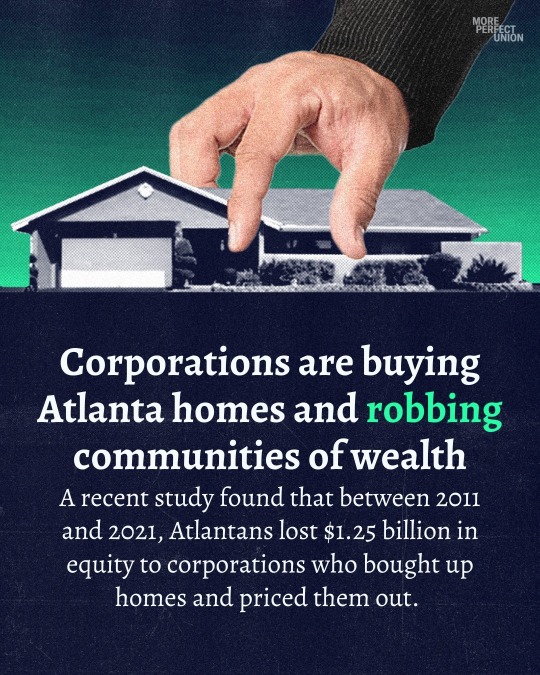
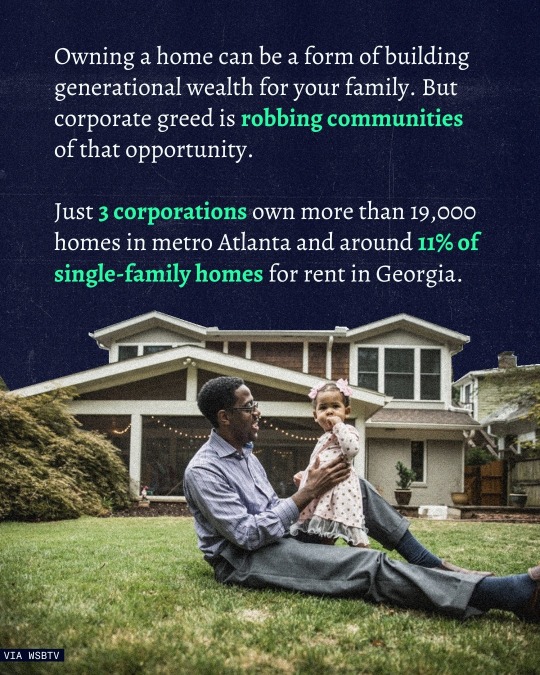
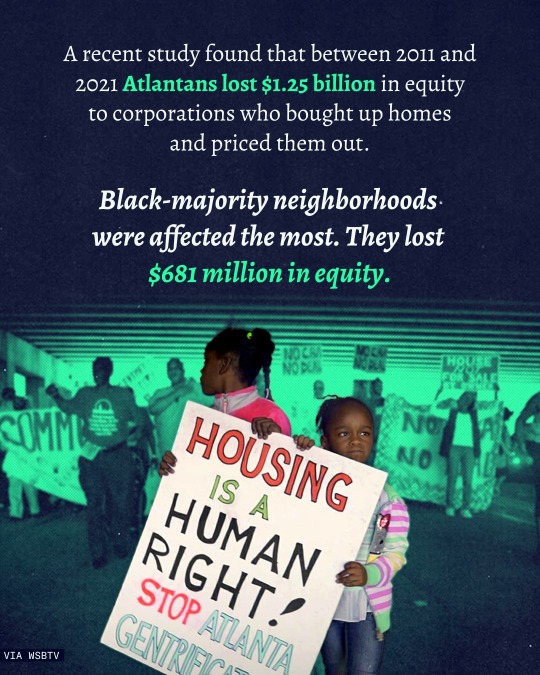
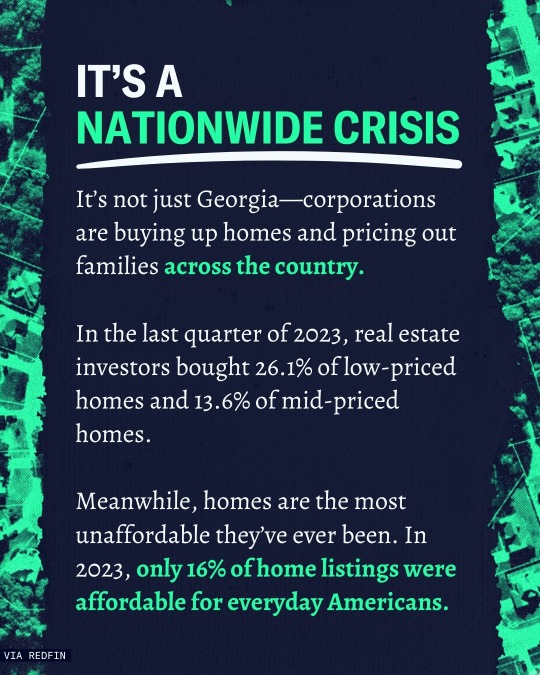
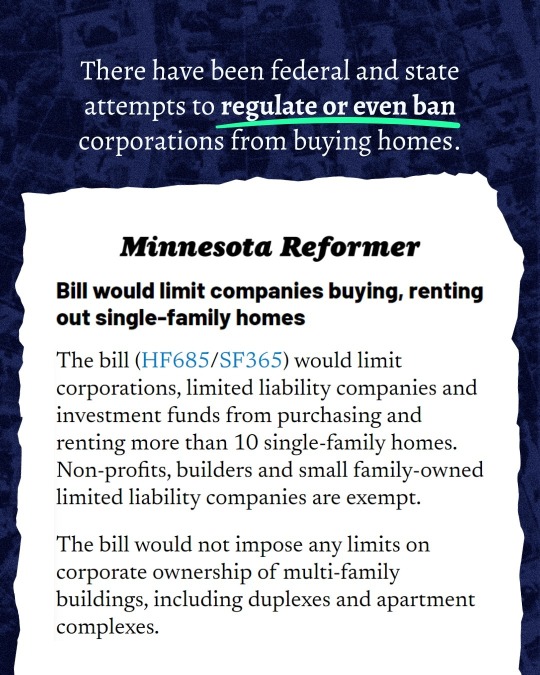
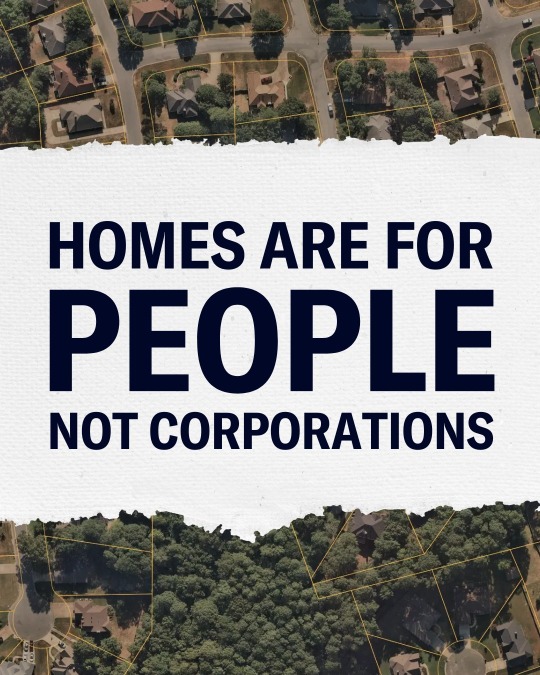



#housing inequality#corporate ownership#home equity#affordable housing#real estate market#wealth disparity#housing crisis#single-family homes#working-class families#corporate landlords#Georgia housing market#property investment#economic disparity#housing affordability#rental market#housing market inequality#corporate real estate#wealth gap#homeownership barriers#housing investment#financial disparity#real estate monopoly#housing affordability crisis#rental housing#economic inequality#property ownership#housing accessibility#corporate influence#affordable homeownership#investment firms in real estate
1K notes
·
View notes
Text
Canadians are bracing for higher grocery bills in 2025, with a new report projecting food prices will increase by 3 to 5 per cent nationwide—and up to 5 per cent in Quebec. According to Sylvain Charlebois, lead author of Canada’s Food Price Report 2025, this could mean an additional $800 in grocery expenses for a family of four. The report highlights that meats, vegetables, coffee and orange juice will be among the most effected. Charlebois said there are several reasons for the increase in prices, including supply chain issues, climate change and the low Canadian dollar.
Continue Reading
Tagging: @newsfromstolenland
#grocery prices#affordability#economic crisis#food prices#climate change#economy#canadian dollar#food insecurity#cdnpoli#canadian politics#canadian news#canada
194 notes
·
View notes
Text
New research highlights the stark choice we face when it comes to climate change: solve the crisis now, or spend a lot more money and resources solving the crisis in the future, after environmental tipping points have been passed. A team from the Pacific Northwest National Laboratory (PNNL) and Los Alamos National Laboratory (LANL) crunched the necessary numbers, using multiple variations on a climate model and the scenario of sea ice loss.
Continue Reading.
135 notes
·
View notes
Text

#blackstone#private equity#corporate landlords#landlords#real estate#monopolistic#untenable#wealth concentration#wealth disparity#wealth distribution#economics#economy#us politics#american politics#political#politics#USpol#housing#housing crisis
119 notes
·
View notes
Text

#economics#greed#climate crisis#environmentalism#republican assholes#never trump#oligarchy#late stage capitalism
83 notes
·
View notes
Text
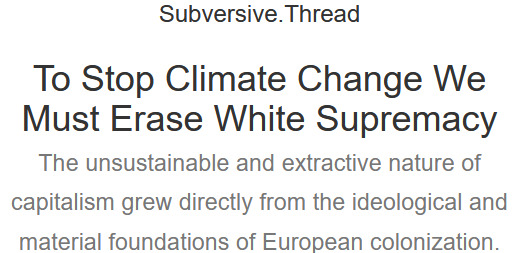

The way most people talk about climate change we are led to believe we all have an equal part in creating the capitalist nightmare we live in, but that’s a lie. The unsustainable and extractive nature of capitalism grew directly from the ideological and material foundations of European colonization. We cannot hold the entire human species responsible for that. It’s victim blaming.
The vast majority of waste is produced by the same people and institutions who hold power. Fighting for our planet, the health of our land, our food, our homes, our communities, is where the fight against capitalism and white supremacy collide. Any fight for environmental justice must also be a fight for racial justice because BI&POC are the ones who disproportionately bear the weight of climate change.
White Settler Colonialism Is Destroying the Planet, Not Poor BI&POC
Don’t believe the Malthusian and eco-fascist myth that there are too many people on the planet to care for. This is a lie peddled by capitalists, eugenicists, and people who advocate for genocide. We know that every landbase has its limit for how much life it can support (indigenous peoples have been saying this for hundreds of years), but “overpopulation” rhetoric is overwhelmingly used as a means to enforce colonial hierarchies where wealthy white people can maintain lives of access and privilege while poor BI&POC barely survive.
Instead of telling poor BI&POC to have less children or to stop wanting better lives, we should build a movement to fight climate change which centers racial justice, abolishes capitalism, and forces wealthy, predominately white populations to stop hoarding resources.
Here are some Earth Day facts for tomorrow so you don’t fall for the lies:
Just 100 companies are responsible for 71% of global emissions. (Source: the Guardian)
Black communities are exposed to 56% more pollution than is caused by their consumption. For Latinx communities, it is 63%. (Source: American Journal of Public Health)
97% of waste produced in the United States is corporate waste. 80% of businesses are owned & operated by white people. (Source: “The Story of Stuff” & US News)
Indigenous peoples make up less than 5% of the planet’s human population, yet they are protecting 80% of its biodiversity. (Source: National Geographic)
The world’s richest 10% produce half of carbon emissions while the poorest half contribute only 10%. (Source: Oxfam)
The world’s wealthiest 16% use 80% of the planet’s natural resources. (Source: CNN)
We are not all equally “responsible.” White settler colonialism and capitalism are destroying the planet, not poor BI&POC.
#climate change#climate crisis#white supremism#community building#practical anarchy#practical anarchism#anarchist society#practical#revolution#anarchism#daily posts#communism#anti capitalist#anti capitalism#late stage capitalism#organization#grassroots#grass roots#anarchists#libraries#leftism#social issues#economy#economics#climate#ecology#anarchy works#environmentalism#environment#solarpunk
175 notes
·
View notes
Text
the sisyphean task of explaining egypt's military rule to foreigners every time something happens to a monument that's famous enough for the rest of the world to care about while we have to deal with this shit on a daily basis
#whats happening to the pyramids is happening to our HOSPITALS that is happening to our BEACHES and to our FACTORIES#being sold to the UAE and the KSA while egyptians still toil at it as cheap labour for the UAE and KSA#and egyptians not seeing a penny from the income from it!!#our entire country down to every inch is being rented to gulf states during our worst economical crisis yet#everything that is ours is being sold and rented to other people's benefit#it's bleak it's bleak as fuck people are starving here#and Sudanese and Palestinian refugees are getting the worst of it#most of the medicine i need i can't find in stores anymore#there's a devastating insulin shortage#the state is cracking down harder than ever at any sort of opposition brutally#this is our daily life and we have to sum it up in a neat paragraph for tumblrinas#every time an example of this happens to something famous enough for them to care about too
98 notes
·
View notes
Text
Xavier Olivé is the last person renting a flat in a building in the Eixample [neighbourhood of Barcelona, Catalonia], after a Dutch company has bought the whole building. He denounces that the owners have expelled all the neighbours who always lived here and now all the other flats are touristic or luxury apartments.
Despite being saddened by the situation and fearing they might expel him as well, he is decided to resist because he doesn't want to leave.
By Barcelona TV. English subtitles added by me.
Sadly, this is a common story in Barcelona and other cities and towns affected by touristic massification.
We urgently need laws that regulate housing so that locals aren't massively expelled to make room for tourists or second homes for rich foreigners, and to stop vulture funds from buying up huge amounts of property to raise the prices. But right now, as a tourist, the most important thing you can do to stop kicking people out of their homes is easy: NEVER, NEVER STAY AT AN AIRBNB, AN UNCONTROLLED TOURISTIC APARTMENT, OR SIMILAR. Always stay at certified hotels (or, of course, with friends and family if you have them there).
If you rent an apartment that is being marketed to tourists where there's a housing crisis for locals, or an Airbnb anywhere, you're effectively destroying the local community.
#actualitat#barcelona#catalunya#tourism#touristic massification#gentrification#housing#coses de la terra#sustainable tourism#europe#travel#airbnb#eixample#capitalism#housing crisis#late stage capitalism#economics#eat the rich
274 notes
·
View notes
Text

207 notes
·
View notes
Text

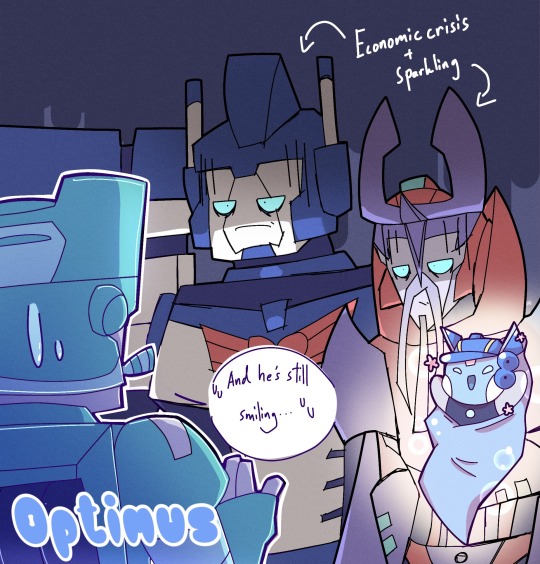

How the Prime siblings got their names (from Uncle Kup!!!)
#sparkling siblings au#transformers animated#tfa#an old comic (ish) I’ve been holding off for too long#Senti being wary and vigilant of any bot who isn’t his creator#hopefully he’ll grow to be a brave soldier#right when Optimus was emerged there was an economic crisis so his creators had to get back to work immediately#but even though they’re tired form working all solar cycle#Optimus’ smile will light their darkest hour#Elita straight up rejects Kups initial name for her#the princess of cybertron demands to be named better by this peasant#tfa optimus prime#tfa sentinel prime#tfa elita one#tfa ultra magnus#alpha trion#kup
943 notes
·
View notes
Text

Funny how the media stopped talking about Greta Thunberg ever since she became explicitly anti-capitalist
#greta thunberg#climate change#climate crisis#socialism#communism#politics#anarchy#marxism#marx#economics#lenin#anarchism#ancom#philosophy#sociology
71 notes
·
View notes
Text
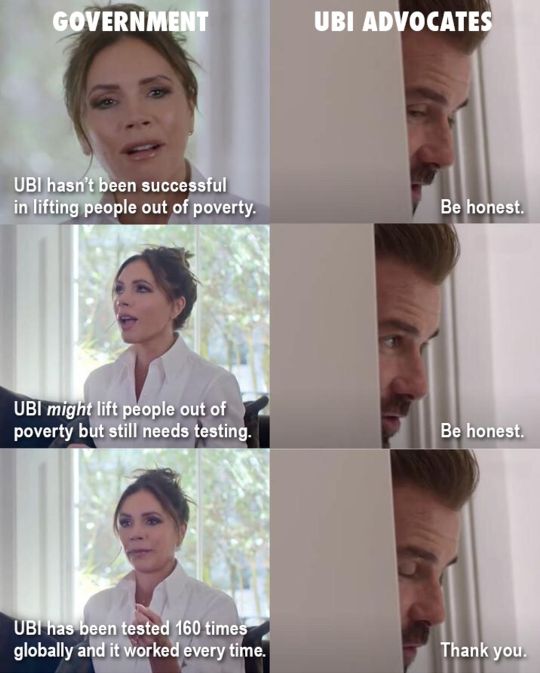

#universal basic income#UBI#social welfare#unconditional transfer payment#means test#guaranteed minimum income#poverty line#full basic income#partial basic income#pilot projects#Mongolia#Iran#child benefit#pension#Bolsa Familia#Thamarat Program#economic crisis#COVID-19 pandemic#direct payments#Alaska Permanent Fund#negative income tax#NIT
207 notes
·
View notes
Text
Thinking about how if Shermy Pines. And like, if he is the baby, he’d be born in the 1970s and be 40 by 2012 and he’s already a grandad. He had to be a teen dad in the 80s (after a severe economic recession) and then his kid ended up being a teen parent by 1999 (Which is 8 years before ANOTHER SEVERE ECONOMIC RECESSION LOL)
Also he was born into a pretty broken family, probably rarely if ever saw his brothers. Do you think he ever saw Stanley before he had to start pretending to be Ford? Do you think Ford visited from college??? Because he didn’t seem confident facing his father until he made millions, so like???
And, like, do you think Filbrick and Caryn changed as parents by the time they raised Shermy? Because it seems like a trend that as parents get older they mellow out a bit, so Shermy probably has a completely different experience with their parents then Stan and Ford, and talking to them is just “is this seriously the same parents???” (Imagine the silent resentment that’d cause 😭😭😭)
Personally I headcannon that Shermy had a daughter (Mabel and Dipper’s mom) and not a son like it says on the wiki because c’mon. Can he just have a daughter. Idk why this is important to me but… c’mon. Can he just have a daughter. It just feels right to me.
#gravity falls#Shermy pines#sherman pines#him being the same age as my parents feels weird#also him and his kid would’ve had kids at like age 14#he’d be like 28 by the time Mabel and Dipper are born#CAN YOU IMAGINE#not even 30 yet#no wonder Mabel and Dipper’s parents are fighting#they got together in like freshman year#that’s if their actual parents are still together#is Shermy even alive tho? bc why didn’t Mabel and Dipper’s parents send them to their actual grandparents#maybe Shermy was an awful parent or something#or maybe he was busy with something else and Stanley was eager to take them#I imagine the call to ‘Stanford’ would’ve been like#‘hey I know you’re probably busy doing scientific research and all but#would you possibly be able to take Mabel and Dipper for the summer?’#and his reaction was just ‘YES. YES. ABSOLUTELY YES. WHEN CAN YOU SEND THEM OVER? CAN YOU SEND THEM OVER NOW???’#Or maybe they just remembered how happy Stan was when he saw Mabel and Dipper for the first time#supposedly he refused to give them back lol#so they’re like ‘hey he’s a lonely old guy. maybe he’d like to spend the summer with the kids’#bc they’re probably aware it’s a lot to ask for someone to take some kids for a WHOLE summer#also maybe Shermy just doesn’t live in a place suitable for kids#like ‘Stanford’ has a whole cabin in the woods#Shermy ‘I had to raise kids in an economic crisis’ Pines might live in an apartment or something#that or he’s dead.#how fucked up would it be if he ACTUALLY died in a car crash#and Stanley winces as his faked death didn’t age well
132 notes
·
View notes
Text
It’s one thing for techbro bullshit artists to take “move fast and break things” as a mantra when they’re pitching vaporware startups to VC. It’s a whole ‘nother thing for shitheads of this ilk to try to run a $30 trillion national economy on that basis.
Where, exactly, are the grownups in the room?
27 notes
·
View notes
Text

A.2.4 Are anarchists in favour of “absolute” liberty?
No. Anarchists do not believe that everyone should be able to “do whatever they like,” because some actions invariably involve the denial of the liberty of others.
For example, anarchists do not support the “freedom” to rape, to exploit, or to coerce others. Neither do we tolerate authority. On the contrary, since authority is a threat to liberty, equality, and solidarity (not to mention human dignity), anarchists recognise the need to resist and overthrow it.
The exercise of authority is not freedom. No one has a “right” to rule others. As Malatesta points out, anarchism supports “freedom for everybody … with the only limit of the equal freedom for others; which does not mean … that we recognise, and wish to respect, the ‘freedom’ to exploit, to oppress, to command, which is oppression and certainly not freedom.” [Errico Malatesta: His Life and Ideas, p. 53]
In a capitalist society, resistance to all forms of hierarchical authority is the mark of a free person — be it private (the boss) or public (the state). As Henry David Thoreau pointed out in his essay on “Civil Disobedience” (1847)
“Disobedience is the true foundation of liberty. The obedient must be slaves.”
#faq#anarchy faq#revolution#anarchism#daily posts#communism#anti capitalist#anti capitalism#late stage capitalism#organization#grassroots#grass roots#anarchists#libraries#leftism#social issues#economy#economics#climate change#climate crisis#climate#ecology#anarchy works#environmentalism#environment#solarpunk#anti colonialism#mutual aid#cops#police
171 notes
·
View notes